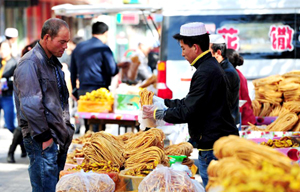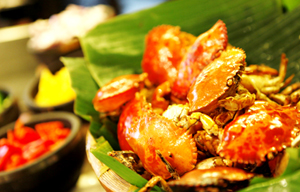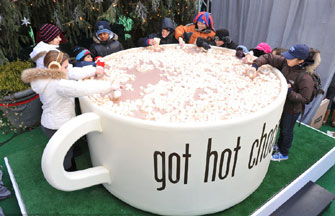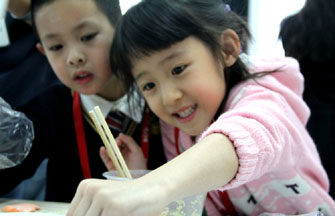
China's makers of merlot and chardonnay have found success at home but have struggled to convince consumers overseas that their vintages can compete with offerings from more established wine nations.
Booths for Chinese vintners displaying bottles of red, white and sparkling wines drew crowds at last week's Vinexpo Asia Pacific in Hong Kong.
But traders at the fair, the largest wine and spirits event of its kind in Asia, say the domestic popularity of the wines does not translate to success in overseas markets.
|
Chinese wine producer Dynasty's booth during Vinexpo Asia Pacific in Hong Kong on May 27. Provided to China Daily |
"The appetite for 'made in China' wines outside China is very limited. If you think about wine, China would not be the place that comes to mind," said Judy Chan, representative of one of a handful of China-based wineries exhibiting at the three-day trade show.
"We really only sell domestically," said Chan, who works for Grace Vineyard, which operates an estate of some 300 hectares of wine production facilities in the northern inland provinces of Shanxi and Ningxia.
Like other exhibitors at the event, Chan believes that a spate of Chinese food safety scandals have discouraged international buyers from purchasing the country's wines. "We have all these problems with our food," she said.
Public concern about food safety is high in China. In 2008, six babies died, and 300,000 others fell ill in a massive scandal involving contaminated milk powder.
"We don't spend too much effort on the overseas market. Their market is mature; we are at an embryonic stage," said Lu Wen, production director for China's Dynasty Fine Wines Group.
"There may be demand from the overseas Chinese population, but we just can't really reach the masses abroad," he said, explaining that 99 percent of the firm's wines are sold domestically.
But Lu added the domestic market is "big enough" for the company to grow, with wines priced below 40 yuan ($6.40) a bottle - compared with the 50 percent duties levied on foreign imports - play a key role in local wine's domination in China. More than 80 percent of all wine consumed in China is made domestically, according to Vinexpo.
Dynasty's financial controller Rex Yeung said culture also plays a part in the popularity of Chinese wine.
"Other than Lafite, many (Chinese customers) just can't pronounce the names (of foreign wines)," he said.
More grapes cultivated
China's relationship with wine stretches back thousands of years, but the country is better known for its wines made from rice, sorghum and mead.
As interest in foreign wines grows in tandem with economic prosperity, China's grape wine production is on the rise.
"We know China can make good wine," said Beijing-based wine blogger Jim Boyce, noting that a century ago, Zhang Bishi of Changyu Pioneer Wine Co in Shandong received international accolades, and 25 years ago, fellow Shandong winery Huadong won medals abroad.
"The difference today is that we see good wine being made throughout the country. The big issue for consumers is actually being able to find good local wines at good prices," he said.
Stretches of land in China's Northern province of Ningxia have been transformed into vineyards that have become internationally recognized.
French multinational luxury goods conglomerate LVMH set up a joint venture there in 2012, helping to produce China's first sparkling wine under the prestigious Chandon label.
'Wines are improving'
But there is a long way to go. "Improving" was the word chosen by most sommeliers and experts to describe the quality of Chinese wines this year.
Vinexpo chief executive officer Guillaume Deglise said: "Their wines are improving. Not all of them, I'm afraid, but some of them already have a very good quality."
Others say patience is required. "It takes time. Vines aren't something you can plant and have good wine that year. Young vines produce a thinner, less attractive wine. It's just nature," said Master of Wine Debra Meiburg.
She added that good Chinese wines are on par with "mid-market" wines suitable for day-to-day drinking, but not for "very special occasions", nor are they "Michelin three-star wines".
"China will rock our wine world - we just have to wait a little longer. It's just too young," she said.
But to other buyers, China is simply not known for its wine.
"We like the products that truly represent the area. I wouldn't even buy white wine from Bordeaux," said Angel Lee, director of Hong Kong-based wine trading company MBL.
"In China, their tea is very good."
Although selling is a different story, when it comes to the casual sniff, swirl and sip, knowing the origin may not be necessary.
"Wine is pleasure. If you don't know the provenance, you have to enjoy what you have," said a French visitor after taking a sip of "People's Chardonnay" at the show.
(China Daily 06/03/2014 page15)

China's top 10 foodie cities |

Cute boxed meals |

Muslims greet annual festival of Eid al-Adha in Yinchuan |

Cafe Noir hosts Singapore food festival |

7 hot drinks to make Christmas merrier |

Sleep in a snow hotel |

Pastry Paradise exhibition opens in London |

Kids Rock the Kitchen with Chopsticks & Beyond |